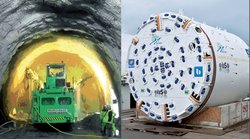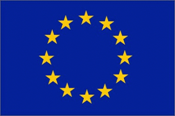NeTTun
New Technologies for Tunnelling and Underground Works


official project web page nettun.org
The aim of NeTTUN is to enable ground-breaking change in the construction, management and maintenance of tunnels. The main scientific and technical challenges of the project are: (i) a multi-sensor ground prediction system for TBMs (Tunnel Boring Machines) to enable effective look-ahead during boring; (ii) a robotic maintenance system that enables automation of inspection and exchange of cutter tools; (iii) the design of cutter tools with increased lifetime; (iv) a system for modelling of global risks on tunnel projects in order to quantify and manage uncertainties; (v) a system for modelling and controlling the impact of tunnelling on surrounding structures; (vi) a Decision Support system for tunnel maintenance management.
| Duration: | 01.09.2012 till 28.02.2017 |
| Donee: | German Research Center for Artificial Intelligence GmbH |
| Sponsor: | European Union |
| Grant number: | Funded by the European Commission; Grant agreement No. 280712 under the Call FP7-NMP. |
| Partner: |
Ecole Centrale De Lyon (COORDINATOR) , NFMTechnologies , BG Ingénieurs Conseils, Delft University of Technology, National Technical University of Athens, Ecole Polytechnique Fédérale de Lausanne, Ingegneria dei SistemiS.p.A., Inexia, Ecole Nationale des Travaux Publics de l’Etat, ME2i, METRO C scpa, OHL Group, RAZEL, University of Leeds, Société Nationale des Chemins de Fer Français, Tallinn University of Technology, UniversityRomaTorVergata, Université de Limoges, Cistème, MI Partners. |
| Application Field: | Logistics, Production and Consumer |
Project details
The NeTTUN project results are envisaged to impact the tunnelling industry in many ways: enlarging business perspectives, increasing the productivity; delivering underground operations with zero impact on surroundings; answering societal needs significantly by improving safety; and strengthening competitiveness of European industry. The Consortium will demonstrate the project results on the construction site of the Metro Line C below some of the Rome’s most ancient monuments, and on the Guadalquivir and Fréjus Tunnels.
In cooperation with the producer of the TBMs, the company NFM Technologies, DFKI RIC will develop a robotic arm to inspect, clean and maintain the cutting tools of the TBMs. The robotic maintenance system will be automated for standard operations, and remotely controlled whenever unforeseen situations are encountered. Thus it will allow maintaining the TBM without the presence of human operators in the pressurized chamber. In a typical task sequence, the drilling head of the TBM is rotated such that its section of interest is located within the workspace of the robot. Then, the cutting tools are cleaned by the robot and remotely inspected by the maintenance personnel. Finally, if a defective or consumed tool is identified, the manipulation system performs its substitution.
In tele-operation mode the robot will be controlled by an expert operator, that working from the control centre, will be able to guide the system in performing the cleaning/inspection/manipulation task of the cutting tool. The commands of the operator will be mapped to the specific kinematics of the robot; movement ranges, forces, and precision, will be scaled according to the task at hand. A force feedback, originating from the interaction between the end-effector with the manipulated object, will be displayed to the operator via a compact haptic interface.
For further indormation please visit the official project web page: www.nettun.org/
Videos
NeTTun: New Technologies for Tunnelling and Underground Works

In cooperation with the producer of the TBMs, the company NFM Technologies, DFKI RIC will develop a robotic arm to inspect, clean and maintain the cutting tools of the TBMs. The robotic maintenance system will be automated for standard operations, and remotely controlled whenever unforeseen situations are encountered.


